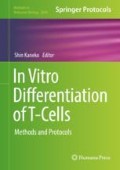Abstract
The use of induced pluripotent stem cells (iPSCs) as a cell source for producing cytotoxic T lymphocytes (CTLs) is expected to have advantages in the antigen specificity, rejuvenation profile, and reproducible number of CTLs. We have developed the way to differentiate CD8αβ T cells from TCR-transduced iPSCs (TCR-iPSCs). These T cells express monoclonal expression of the transduced TCR. Generating CD8αβ CTLs from TCR-iPSC could contribute to safe and effective allogeneic regenerative T cell immunotherapies.
Access this chapter
Tax calculation will be finalised at checkout
Purchases are for personal use only
References
Restifo NP, Dudley ME, Rosenberg SA (2012) Adoptive immunotherapy for cancer: harnessing the T cell response. Nat Rev Immunol 12(4):269–281
Minagawa A, Kaneko S (2014) Rise of iPSCs as a cell source for adoptive immunotherapy. Hum Cell 27(2):47–50
Kitayama S et al (2016) Cellular adjuvant properties, direct cytotoxicity of re-differentiated Valpha24 invariant NKT-like cells from human induced pluripotent stem cells. Stem Cell Reports 6(2):213–227
Nishimura T et al (2013) Generation of rejuvenated antigen-specific T cells by reprogramming to pluripotency and redifferentiation. Cell Stem Cell 12(1):114–126
Sugita S et al (2016) Lack of T cell response to iPSC-derived retinal pigment epithelial cells from HLA homozygous donors. Stem Cell Reports 7(4):619–634
Hashizume O et al (2015) Epigenetic regulation of the nuclear-coded GCAT and SHMT2 genes confers human age-associated mitochondrial respiration defects. Sci Rep 5:10434
Abe A et al (2015) An enhancer of the IL-7 receptor alpha-chain locus controls IL-7 receptor expression and maintenance of peripheral T cells. J Immunol 195(7):3129–3138
Author information
Authors and Affiliations
Corresponding author
Editor information
Editors and Affiliations
Rights and permissions
Copyright information
© 2019 Springer Science+Business Media, LLC, part of Springer Nature
About this protocol
Cite this protocol
Minagawa, A., Kaneko, S. (2019). Differentiating CD8αβ T Cells from TCR-Transduced iPSCs for Cancer Immunotherapy. In: Kaneko, S. (eds) In Vitro Differentiation of T-Cells. Methods in Molecular Biology, vol 2048. Humana, New York, NY. https://doi.org/10.1007/978-1-4939-9728-2_9
Download citation
DOI: https://doi.org/10.1007/978-1-4939-9728-2_9
Published:
Publisher Name: Humana, New York, NY
Print ISBN: 978-1-4939-9727-5
Online ISBN: 978-1-4939-9728-2
eBook Packages: Springer Protocols

